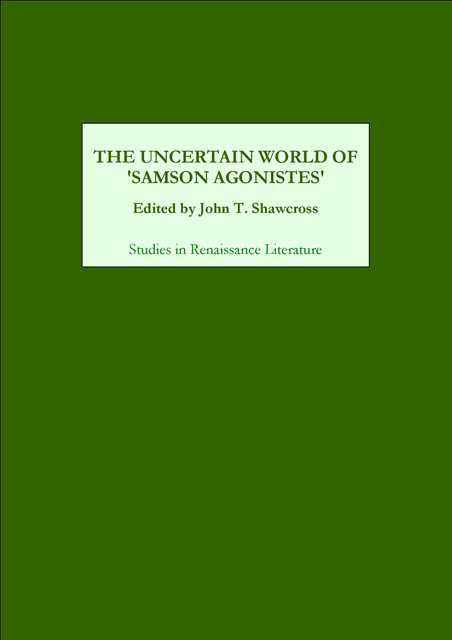Book contents
- Frontmatter
- Contents
- Preface
- Chapter 1 The World of Samson Agonistes
- Chapter 2 Uncertainty and the Text
- Chapter 3 The Dramatic Work and its Reading
- Chapter 4 Samson: God’s Champion, a Type, or Individual?
- Chapter 5 Dalila: Seductress or Wife?
- Chapter 6 Politics in the Destabilized Text
- Chapter 7 Biographical Intrusions
- Chapter 8 The Uncertainties of Irony
- Chapter 9 A Hermeneutics of the Text
- Chapter 10 Samson Agonistes and Consistencies of Belief
- Works Cited
- Index
Chapter 5 - Dalila: Seductress or Wife?
Published online by Cambridge University Press: 22 March 2023
- Frontmatter
- Contents
- Preface
- Chapter 1 The World of Samson Agonistes
- Chapter 2 Uncertainty and the Text
- Chapter 3 The Dramatic Work and its Reading
- Chapter 4 Samson: God’s Champion, a Type, or Individual?
- Chapter 5 Dalila: Seductress or Wife?
- Chapter 6 Politics in the Destabilized Text
- Chapter 7 Biographical Intrusions
- Chapter 8 The Uncertainties of Irony
- Chapter 9 A Hermeneutics of the Text
- Chapter 10 Samson Agonistes and Consistencies of Belief
- Works Cited
- Index
Summary
BECAUSE of his importance in the history of literature and culture itself, Milton has been singled out as an epitome of influence upon people’s thinking about gender concerns. The view of Eve that some readers have seen in Paradise Lost is accepted both as valid and as reflective of Milton’s own beliefs. Since Eve is prototypical woman, the characterization that is advanced becomes the commonplace analysis of woman by and for a male audience and, through patriarchal domination, for a female audience as well. The point of Milton’s influence on culture and of subordinate, inferior status for woman in patriarchal society was made by Virginia Woolf in her reference to “Milton’s bogey” in A Room of one’s Own. The first part of that point is eminently correct, for many people have learned even their Bible from Milton’s poem: what is read there is what is deemed Truth. But of course that depends on how one interprets what is read, and in the case of Eve much depends on not only careful and deep reading but on what attitudes, expectations, and beliefs the reader starts with. The gender relationships of the second part of that bogey have, from Hebraic times to the present, been observable in practice and thus in attitude over and over again, though Milton and his poem be nowhere in the background of those who so classify woman. Again it should be obvious that the second part in terms of Milton and his poem depends upon the interpretation of the poem and its characterization of Eve. If readers see Eve as inferior and take on Adam’s attitude in his Book X diatribe in Paradise Lost, then many people can be said to have learned of Woman’s alleged inferior and evil nature from it; but if one reads differently, chalking up Adam’s action and reaction to Milton’s scorn, one comes to see Woman as the hope for salvation. A masculinist attitude is not removed, but anything misogynistic is dispelled. “Milton’s bogey” should be read not as what Milton believed to be a “bogey,” but as the “bogey” that one kind of reading of Paradise Lost can create for some people.
- Type
- Chapter
- Information
- The Uncertain World of Samson Agonistes , pp. 65 - 80Publisher: Boydell & BrewerPrint publication year: 2001

